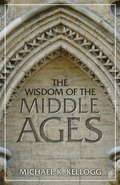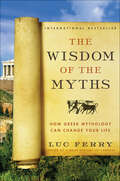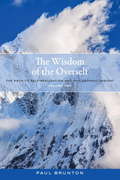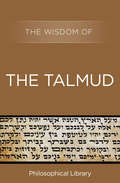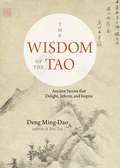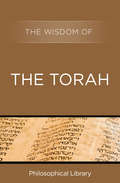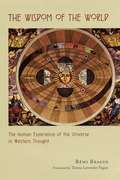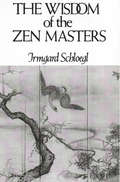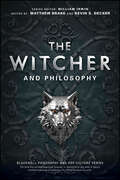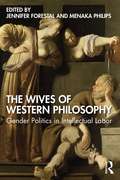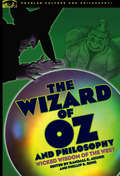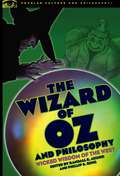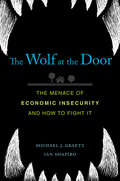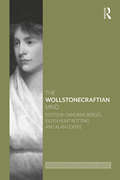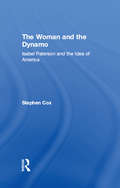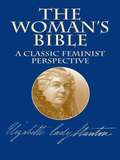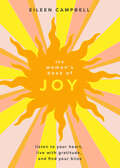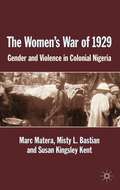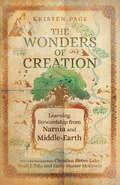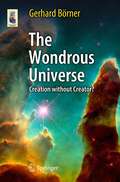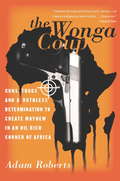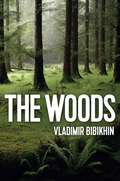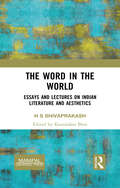- Table View
- List View
The Wisdom of the Middle Ages
by Michael K. KelloggThis engaging survey of important works from late antiquity to the beginning of the Renaissance reveals the depth of thought and the diversity of expression that characterized the Middle Ages. Michael Kellogg demonstrates that medieval thought owes far more to ancient philosophy than is generally supposed; that poets of this era were as sophisticated and nuanced as their ancient counterparts; and that writers of this time anticipated most of the lines of inquiry that gave rise to the Renaissance. The author examines philosophical treatises, memoirs, letters, tales, romances, and epics, documenting the unique array of evolving concerns that drove the medieval search for wisdom. Among the authors and works discussed are Augustine's Confessions; Boethius's Consolation of Philosophy; Beowulf; the writings of Abelard and Heloise, Francis of Assisi, and Thomas Aquinas; the Song of Roland; the Arthurian romances of Chrétien de Troyes; Dante's Divine Comedy; and the tales of Boccaccio and Chaucer.Written for the lay reader, this lively overview of a flourishing era, often devalued in our time as a benighted period of history, will bring a new appreciation to the many accomplishments of the Middle Ages.From the Hardcover edition.
The Wisdom of the Myths: How Greek Mythology Can Change Your Life (Learning To Live Ser.)
by Luc Ferry“Marvelously wise and expansive. . . . one could call [Ferry’s] prose conversational, but it’s rare to have a conversation quite this wonderful.” —Boston GlobeA fascinating journey through Greek mythology that explains the myths' timeless lessons and meaningHeroes, gods, and mortals. The Greek myths are the founding narratives of Western civilization: to understand them is to know the origins of philosophy, literature, art, science, law, and more. Indeed, as Luc Ferry shows in this masterful book, they remain a great store of wisdom, as relevant to our lives today as ever before. No mere legends or clichés (“Herculean task,” “Pandora's box,” “Achilles heel,” etc.), these classic stories offer profound and manifold lessons, providing the first sustained attempt to answer fundamental human questions concerning “the good life,” the burden of mortality, and how to find one's place in the world. Vividly retelling the great tales of mythology and illuminating fresh new ways of understanding them, The Wisdom of the Myths will enlighten readers of all ages.“With Luc Ferry as a guide, our passage through the storied landscape of Greek mythology becomes a captivating lesson in philosophy.” —Le Monde (France)“Ferry draws out deeper meanings of myths about how the world works and of the place of mortals in it . . . The Wisdom of the Myths is part of a grand enterprise to revive practical wisdom and secular humanism.” —The Guardian“Comprehensive. . . . [T]he breadth of evidence will sway most readers –Publishers Weekly“Impressive. . . . A worthy, fun way to enjoy the ancient myths while learning some philosophy.” —Kirkus Reviews
The Wisdom of the Overself
by Paul BruntonInspired by Paul Brunton's years spent with sages in Asia, The Wisdom of the Overself and its companion volume The Hidden Teaching Beyond Yoga were written at the request of these remarkable teachers, who recognized that Brunton had a significant role to play in the transmission of traditional wisdom to the West. Here is a profound re-creation of these teachings, brought to life and made accessible by Brunton's insights. In print since the 1940s, Brunton's works are considered to be among the most comprehensive, clear, and practical guides on the path to enlightenment. Brunton unfolds the grand vision for human development by investigating consciousness as the source of all experience; how to move from ego-centered life to the transcendent reality; the interplay of karma, free will, and grace; the nature of evil and suffering; how to awaken intuition and penetrative insight; the passage through death to rebirth; and psychic experiences and mystic visions. He also provides seven ultramystic exercises to open the door to higher consciousness, including a healing meditation on the sun; practices for transforming the future, dream, and sleep; and a meditation on the timeless self. These techniques lead to the deepest spiritual realizations--to the true "Wisdom of the Overself."This new edition has been updated to incorporate Brunton's final revisions. It includes a new foreword plus supplementary reading material selected from the author's archives by the Paul Brunton Philosophic Foundation.ContentsForeword by the Paul Brunton Philosophic Foundation 1. Prefatory 2. The Meaning of Mentalism 3. The Birth of the Universe4. Studies in Dreams5. The Metaphysics of Sleep6. The Secret of the "I"7. The Scorpion of Death8. The Immortal Overself 9. The Shadows of Evil and Suffering10. The War and the World11. The World-Mind12. The Unveiling of Reality 13. Initiation into Mystical Experience 14. The Yoga of the Discerning Mind 15. The Mystical Phenomena of Meditation 16. Some Fruits of PhilosophyAppendix: Additional Resources from The Notebooks of Paul Brunton, Compiled by the Paul Brunton Philosophic Foundation EditorsFrom the Trade Paperback edition.
The Wisdom of the Talmud: The Wisdom Of The Torah, The Wisdom Of The Talmud, The Wisdom Of The Koran, The Wisdom Of Muhammad, And The Wisdom Of Buddha (Wisdom)
by The Wisdom SeriesDiscover the ancient wisdom and historical influence of a cornerstone of Judaism The Wisdom of the Talmud presents a thorough history and overview of the Talmud, the rabbinical commentary on the Torah that was developed in the Jewish academies of Palestine and Babylonia. From the close of the Biblical canon to the end of the fifth century, Jewish scholars studied the scripture and worked to develop—and debate—supplementary understandings of the Torah&’s directions on a variety of topics. From man&’s purpose and miracles, to marriage and wellness, to consciousness and community, the Talmud considers what it means to practice faith on a daily basis and through a changing world. This book is an essential and approachable guide for understanding how interpretation of the Torah has guided Jewish life for thousands of years. This ebook features a new foreword, image gallery, and list of proverbs and sayings of the rabbis.
The Wisdom of the Tao: Ancient Stories that Delight, Inform, and Inspire
by Deng Ming-Dao<p>Taoism is an ancient Chinese philosophy that emphasizes living in harmony with the universe. It is a tradition that has become widely popular in Europe and North America over the past fifty years--largely through its core text, the Tao Te Ching. <p>The Wisdom of the Tao is filled with over 140 ancient stories express great truth by fusing anecdotes with philosophy. The stories are frequently humorous, ribald, irreverent, or sarcastic--but they always speak to great and universal truths.</p>
The Wisdom of the Torah: The Wisdom Of The Torah, The Wisdom Of The Talmud, The Wisdom Of The Koran, The Wisdom Of Muhammad, And The Wisdom Of Buddha (Wisdom)
by The Wisdom SeriesCelebrate one of the world&’s greatest collections of pure literature In Hebrew, the word Torah means instruction, and throughout thousands of years this collection of writing has offered just that—instruction in the central beliefs of three world religions: Judaism, Christianity, and Islam. But by observing the Torah, or the Hebrew Bible, as a collected work of multiple authors spanning generations, the modern reader can look beyond its fundamental instruction. The Wisdom of the Torah concentrates on the Hebrew Bible as a book of philosophy and literature and offers some of its most powerful and poetic passages, including &“The Poems of King David,&” &“The Parables of King Solomon,&” and &“The Love Songs of King Solomon.&” In these works, readers find many lyrical and timeless reflections on what it means to have faith and to be a member of the human race. This ebook features a new introduction, image gallery, timeline of the Torah and Judaic history, and index of the Books of the Torah.
The Wisdom of the World: The Human Experience of the Universe in Western Thought
by Rémi BragueWhen the ancient Greeks looked up into the heavens, they saw not just sun and moon, stars and planets, but a complete, coherent universe, a model of the Good that could serve as a guide to a better life. How this view of the world came to be, and how we lost it (or turned away from it) on the way to becoming modern, make for a fascinating story, told in a highly accessible manner by Rémi Brague in this wide-ranging cultural history. Before the Greeks, people thought human action was required to maintain the order of the universe and so conducted rituals and sacrifices to renew and restore it. But beginning with the Hellenic Age, the universe came to be seen as existing quite apart from human action and possessing, therefore, a kind of wisdom that humanity did not. Wearing his remarkable erudition lightly, Brague traces the many ways this universal wisdom has been interpreted over the centuries, from the time of ancient Egypt to the modern era. Socratic and Muslim philosophers, Christian theologians and Jewish Kabbalists all believed that questions about the workings of the world and the meaning of life were closely intertwined and that an understanding of cosmology was crucial to making sense of human ethics. Exploring the fate of this concept in the modern day, Brague shows how modernity stripped the universe of its sacred and philosophical wisdom, transforming it into an ethically indifferent entity that no longer serves as a model for human morality. Encyclopedic and yet intimate, The Wisdom of the World offers the best sort of history: broad, learned, and completely compelling. Brague opens a window onto systems of thought radically different from our own.
The Wisdom of the World: The Human Experience of the Universe in Western Thought
by Rémi BragueWhen the ancient Greeks looked up into the heavens, they saw not just sun and moon, stars and planets, but a complete, coherent universe, a model of the Good that could serve as a guide to a better life. How this view of the world came to be, and how we lost it (or turned away from it) on the way to becoming modern, make for a fascinating story, told in a highly accessible manner by Rémi Brague in this wide-ranging cultural history. Before the Greeks, people thought human action was required to maintain the order of the universe and so conducted rituals and sacrifices to renew and restore it. But beginning with the Hellenic Age, the universe came to be seen as existing quite apart from human action and possessing, therefore, a kind of wisdom that humanity did not. Wearing his remarkable erudition lightly, Brague traces the many ways this universal wisdom has been interpreted over the centuries, from the time of ancient Egypt to the modern era. Socratic and Muslim philosophers, Christian theologians and Jewish Kabbalists all believed that questions about the workings of the world and the meaning of life were closely intertwined and that an understanding of cosmology was crucial to making sense of human ethics. Exploring the fate of this concept in the modern day, Brague shows how modernity stripped the universe of its sacred and philosophical wisdom, transforming it into an ethically indifferent entity that no longer serves as a model for human morality. Encyclopedic and yet intimate, The Wisdom of the World offers the best sort of history: broad, learned, and completely compelling. Brague opens a window onto systems of thought radically different from our own.
The Wisdom of the World: The Human Experience of the Universe in Western Thought
by Rémi BragueWhen the ancient Greeks looked up into the heavens, they saw not just sun and moon, stars and planets, but a complete, coherent universe, a model of the Good that could serve as a guide to a better life. How this view of the world came to be, and how we lost it (or turned away from it) on the way to becoming modern, make for a fascinating story, told in a highly accessible manner by Rémi Brague in this wide-ranging cultural history. Before the Greeks, people thought human action was required to maintain the order of the universe and so conducted rituals and sacrifices to renew and restore it. But beginning with the Hellenic Age, the universe came to be seen as existing quite apart from human action and possessing, therefore, a kind of wisdom that humanity did not. Wearing his remarkable erudition lightly, Brague traces the many ways this universal wisdom has been interpreted over the centuries, from the time of ancient Egypt to the modern era. Socratic and Muslim philosophers, Christian theologians and Jewish Kabbalists all believed that questions about the workings of the world and the meaning of life were closely intertwined and that an understanding of cosmology was crucial to making sense of human ethics. Exploring the fate of this concept in the modern day, Brague shows how modernity stripped the universe of its sacred and philosophical wisdom, transforming it into an ethically indifferent entity that no longer serves as a model for human morality. Encyclopedic and yet intimate, The Wisdom of the World offers the best sort of history: broad, learned, and completely compelling. Brague opens a window onto systems of thought radically different from our own.
The Wisdom of the Zen Masters
by Irmgard Schloegl Christmas HumphreysUnlike most other formal religions, the Japanese school of Zen Buddhism has no canonized corpus of sacred literature which will reveal the "truth" to diligent readers. There are, however, numerous collections of anecdotes and aphorisms that may serve to convey the sensibility which underscores the practice of Zen. Drawing on these traditional sources, Dr. Irmgard Schloegl of the Buddhist Society in London has gathered into one short volume a sampling of stories and sayings that are a valuable introduction to the study of Zen. "If in every mind burns a flame of the Buddha's Enlightenment," Christmas Humphreys writes in his foreword to The Wisdom of the Zen Masters, "there is nothing to seek and nothing to acquire. We are enlightened, and all the words in the world will not give us what we already have. The man of Zen, therefore, is concerned with one thing only, to become aware of what he already is..." The task of the Japanese Zen master has been to guide his pupils in their awakening. The means used vary--from severe physical discipline to the proposition of enigmatic riddles, or koans--but always to the same end, Enlightenment: experiencing the Great Death of the worldly "I."
The Witcher and Philosophy: Toss a Coin to Your Philosopher (The Blackwell Philosophy and Pop Culture Series)
by Kevin S. Decker Matthew BrakeEmbark on a revealing philosophical journey through the universe of The Witcher “If I'm to choose between one evil and another, I'd rather not choose at all,” growls the mutant “witcher,” Geralt of Rivia. Andrzej Sapkowski's Witcher books lay bare the adventures of monster hunters like Geralt, who seek to avoid humanity's conflicts and live only for the next kill and the coin that comes with it. But Geralt's destiny is complicated by his relationship with a powerful sorceress, Yennefer of Vengerberg. When he connects with a displaced princess, Ciri, Geralt lands right in the middle of the political conflicts of the Continent, which is endangered by Nilfgaard, a domineering southern kingdom that threatens to conquer the world. Part of the Blackwell Philosophy and Pop Culture series, The Witcher and Philosophy brings on twenty-seven philosophers to test their mettle against werewolves, the bruxa, strigas, vodyanoi, and kikimora; their work addresses the phenomenally popular books, three standalone Witcher video games, and the hit Netflix streaming show. These authors pass on their fascination with all manner of horror and sorcery: the mutations that make Geralt and others witchers, the commonalities between the Continent and post-apocalyptic settings, the intricacies of political power and scandal in the world of The Witcher, and reflections of our own world's changing views on race and gender that might offer hope—or portend a grim future. Engaging and accessible, The Witcher and Philosophy considers key themes and questions such as: Who is human, and who is a monster? Can Geralt afford to stay neutral? What kind of politics do sorceresses engage in? How many universes converge on the Continent? If we stare long enough into the abyss, does it stare back into us? Silver or steel? “Destiny is just the embodiment of the soul's desire to grow,” says Jaskier the bard, proving himself to be a natural philosopher. The tales of The Witcher remind us that our lives are a play written by both choice and destiny. And it is your destiny to read and be inspired by The Witcher and Philosophy.
The Wives of Western Philosophy: Gender Politics in Intellectual Labor
by Jennifer Forestal and Menaka PhilipsThe Wives of Western Philosophy examines the lives and experiences of the wives and women associated with nine distinct political thinkers—from Socrates to Marx—in order to explore the gendered patterns of intellectual labor that permeate the foundations of Western political thought. Organized chronologically and representative of three eras in the history of political thought (Ancient, Early Modern, and Modern), nine critical biographical chapters explore the everyday acts of intellectual labor and partnership involving these "wives of the canon." Taking seriously their narratives as intimate partners reveals that wives have labored in remarkable ways throughout the history of political thought. In some cases, their labors mark the conceptual boundaries of political life; in others, they serve as uncredited resources for the production of political ideas. In all instances, however, these wives and intimates are pushed to the margins of the history of political thought. The Wives of Western Philosophy brings these women to the center of scholarly interest. In so doing, it provides new insights into the intellectual biographies of some of the most famed men in political theory while also raising important questions about the gendered politics of intellectual labor which shape our receptions of canonical texts and thinkers, and which sustain the academy even today.
The Wizard of Oz and Philosophy
by Randall E. Auxier Phil SengFrom the bedtime story by L. Frank Baum to the classic 1939 film, no story has captured the imaginations of generations of children - and adults - like The Wizard of Oz. The story of Dorothy's journey through Oz, the colorful characters, places, songs, and dialogue have permeated popular culture around the world. The contributors to this volume take a very close look at The Wizard of Oz and ask the tough questions about this wonderful tale. They wonder if someone can possess a virtue without knowing it, and if the realm of Oz was really the dream or if Kansas was the dream. Why does water melt the Wicked Witch of the West and why does Toto seem to know what the other characters can't seem to figure out? The articles included tackle these compelling questions and more, encouraging readers to have discussions of their own.
The Wizard of Oz and Philosophy: Wicked Wisdom of the West
by Randall E. Auxier Phillip S. SengEssays explore philosophical themes in the Wizard of Oz saga, comprising the books by L. Frank Baum, the 1939 film, the novel Wicked, and related films and plays.
The Wolf at the Door: The Menace of Economic Insecurity and How to Fight It
by Ian Shapiro Michael J. GraetzAmericans face economic hardship but respond with fantastical solutions, from tax-cut magic to the end of capitalism. Michael Graetz and Ian Shapiro focus on what truly worries people: their own insecurity. The authors propose concrete reforms affecting jobs, unemployment, health care, and wages and share strategies to achieve changes people need.
The Wollstonecraftian Mind (Routledge Philosophical Minds)
by Eileen Hunt Botting Sandrine Bergès Alan CoffeeThere has been a rising interest in the study of Mary Wollstonecraft (1759-1797) in philosophy, political theory, literary studies and the history of political thought in recent decades. The Wollstonecraftian Mind seeks to provide a comprehensive survey of her work, not only placing it in its historical context but also exploring its contemporary significance. Comprising 38 chapters by a team of international contributors this handbook covers: the background to Wollstonecraft’s work Wollstonecraft’s major works the relationship between Wollstonecraft and other major philosophers Wollstonecraftian philosophy Wollstonecraft’s legacy Essential reading for students and researchers in philosophy, Wollstonecraft’s work is central to the study of political philosophy, literature, French studies, political thought, and feminism.
The Woman and the Dynamo: Isabel Paterson and the Idea of America
by Stephen CoxNovelist, columnist, cultural critic, political theorist-- Isabel Paterson was one of the most extraordinary personalities of the 1930s, renowned for her incisive wit and her unique interpretation of the American experience. The Woman and the Dynamo is the first biography of a woman who has long been a source of rumor and legend. From interviews, private papers, and her millions of published words, Stephen Cox weaves a narrative that brings Paterson vividly to life.A radical individualist in both theory and practice, Paterson spent her early life on the Western frontier, "lavished" two years on formal education, set a record for high-altitude flight, became a journalist by "accident," and made herself a fearless chronicler and conscience of New York literary life. At the same time, she made a permanent contribution to American political thought.Paterson identified the fundamental issues at stake in the crises of the twentieth century and responded with an original theory of history and political economy. In her view, the individual mind is the dynamo of history, working through the "long circuit" of institutions that maintain and enhance individual liberty; and America is the place where the advanced forms of those institutions were invented and are currently undergoing their severest trial. While other intellectuals derided the American ideal of progress and called for the restraint or abolition of the capitalist system, Paterson demanded a scrupulous application of the "engineering principles" on which American civilization had been built.The Woman and the Dynamo provides one of the few broad and detailed accounts of the origins of the American political Right, emphasizing the special role that women and imaginative writers played in its creation, and posing new questions about what it means to be "left" or "right," "liberal" or "conservative" in America. This will be compelling reading for those interested in twentieth century intellectual history, literature, and politics.
The Woman's Bible: A Classic Feminist Perspective
by Elizabeth Cady StantonBook-by-book examination of the Bible by pioneer in women's rights movement places events in their historical context, interprets passages as both allegory and fact, and compares them with myths of other cultures. In the tradition of radical individualism, Stanton's attack on religious orthodoxy represents a political treatise rather than a scholarly work.
The Woman's Book of Joy: Listen to Your Heart, Live with Gratitude, and Find Your Bliss
by Eileen CampbellExperience Serenity and Hope Daily“The Woman’s Book of Joy is like a comforting friend supporting us in our struggles.” —Mandy Keast-Southall, therapist and yoga teacherWhen you learn to tap into the deep wellspring of joy that is within you, nothing is impossible.A book of joy. Women have a great many challenges to deal with in their lives. Among the most ubiquitous of those challenges is self-care. Too often, we are focused on caring for others and not ourselves. Low self-esteem, anxiety, and depression are all too common when our lives are less fulfilling than they could be. Yet deep within, women have a tremendous spiritual resource―a capacity for real joy that is not dependent on anything external. It is always available, regardless of circumstances.Find your inner spirituality. Many self-help books can lead people into further self-judgement. Instead, The Woman’s Book of Joy encourages and inspires women to care more deeply for themselves and to face life’s challenges with courage and joy. It’s a practical motivational book for accessing inner wisdom, enhancing self-esteem, overcoming sorrow, and deepening relationships.Thinking deeply. The meditations and affirmations in this book will provide you with the opportunity to contemplate a wide range of topics, including:Developing awarenessLetting goBelieving in your dreamsLiving in the nowFinding your true purposePracticing kindnessBeing optimisticTrusting the universeAppreciating life’s blessingsIf you found joy in meditation books and inspirational books for women like I've Been Thinking…, Journey to the Heart, and Each Day a New Beginning, you’ll be encouraged and uplifted by The Woman's Book of Joy.
The Women’s War of 1929
by Marc MateraIn 1929, tens of thousands of south eastern Nigerian women rose up against British authority in what is known as the Women's War. This book brings togther, for the first time, the multiple perspectives of the war's colonized and colonial participants and examines its various actions within a single, gendered analytical frame.
The Wonders of Creation: Learning Stewardship from Narnia and Middle-Earth (Hansen Lectureship Series)
by Kristen PageWhen an author of fiction employs the imagination and sets characters in a new location, they are in a sense creating a world. Might such fictional worlds give us a deeper appreciation for our own?Many readers have found themselves, like the Pevensie children, transported by C. S. Lewis into Narnia, and they have traveled from Lantern Waste to Cair Paravel and the edge of the sea. Thanks to J. R. R. Tolkien, readers have also journeyed with Bilbo, Frodo, and their companions across Middle-earth from the Shire to the Lonely Mountain, the forest of Mirkwood, the mines of Moria, and the very fires of Mount Doom. But as often as we enter these fictional worlds as readers, we eventually return to our world refreshed with sharpened insight.The Wonders of CreationBased on the annual lecture series hosted at Wheaton College's Marion E. Wade Center, volumes in the Hansen Lectureship Series reflect on the imaginative work and lasting influence of seven British authors: Owen Barfield, G. K. Chesterton, C. S. Lewis, George MacDonald, Dorothy L. Sayers, J. R. R. Tolkien, and Charles Williams.
The Wondrous Universe
by Gerhard BörnerThe world as it is viewed from modern physics and cosmology has many strange and unexpected features. Often these are in stark contrast with our everyday experience or our preconceptions, such as the concept of space and time as finite and changeable. Nevertheless it is this strange world which is the fundamental basis of our existence. Therefore modern science also has a few things to say about the age-old questions: Who are we? - Where do we come from? - Where are we going? The author, an experienced scientist and teacher, presents the knowledge that we have about our world for non-experts. He takes us on a journey through cosmology and the quantum world of elementary particles. And he sketches the impact of the insights gained into philosophical assumptions and religious beliefs in these disciplines. In the end he asks the speculative question whether there is something beyond the limits of the natural sciences.
The Wonga Coup: Guns, Thugs, and a Ruthless Determination to Create Mayhem in an Oil-Rich Corner of Africa
by Adam RobertsEquatorial Guinea is a tiny country roughly the size of the state of Maryland. Humid, jungle covered, and rife with unpleasant diseases, natives call it Devil Island. Its president in 2004, Obiang Nguema, had been accused of cannibalism, belief in witchcraft, mass murder, billiondollar corruption, and general rule by terror. With so little to recommend it, why in March 2004 was Equatorial Guinea the target of a group of salty British, South African and Zimbabwean mercenaries, travelling on an American-registered ex-National Guard plane specially adapted for military purposes, that was originally flown to Africa by American pilots? The real motive lay deep below the ocean floor: oil. In The Dogs of War, Frederick Forsyth effectively described an attempt by mercenaries to overthrow the government of Equatorial Guinea - in 1972. And the chain of events surrounding the night of March 7, 2004, is a rare case of life imitating art-or, at least, life imitating a 1970s thriller-in almost uncanny detail. With a cast of characters worthy of a remake of Wild Geese and a plot as mazy as it was unlikely, The Wonga Coup is a tale of venality, overarching vanity and greed whose example speaks to the problems of the entire African continent.
The Woods (New Russian Thought)
by Vladimir BibikhinIn our modern, urbanized societies, our engagement with the natural world often seems distant and superficial. Human life is now far removed from its prehistoric origins, when humans dwelt deep within the forests and depended on them for their survival. In this important book, Vladimir Bibikhin, one of Russia’s most influential twentieth-century philosophers, argues that, although most humans now live far from woods and forests, our existence remains profoundly linked to them. It was Aristotle who first appreciated their primal role, even deriving his notion of ‘matter’w from the Greek words for wood and forest. As timber, the woods may be seen as inanimate material, but at the same time they also constitute a living ecosystem and the source of energy and life. By opening up this duality, the woods are transformed from simple matter to a living environment, serving as a reminder that we belong to the world of biological life to a far greater extent than we usually think. The Woods will be of interest to students and scholars in philosophy and the humanities generally and to anyone concerned with the environment and our relationship to the natural world.
The Word in the World: Essays and Lectures on Indian Literature and Aesthetics
by H S ShivaprakashThe Word in the World is a collection of essays and lectures by H S Shivaprakash, a well-known poet, playwright, and translator. Edited by Kamalakar Bhat, this book brings together Prof Shivaprakash’s interventions in the realm of issues that are entwined with the continuities and discontinuities in the cultural negotiations of India. Distinctively, these are essays on subjects ranging from the nature and significance of medieval works of literature in India to issues arising out of developments in Indian aesthetics. The unfeigned magnitude of this work must be found among students and scholars, who will gain from it a perspective significantly different from the ones available in the prevailing academic discourses, thus indicating a way beyond poststructuralist/postmodernist frameworks. This is a book that will interest a wide variety of readers with its engaging insights and breadth of reference especially because it is written in a comprehensible style. Print edition not for sale in South Asia (India, Sri Lanka, Nepal, Bangladesh, Pakistan and Bhutan)
